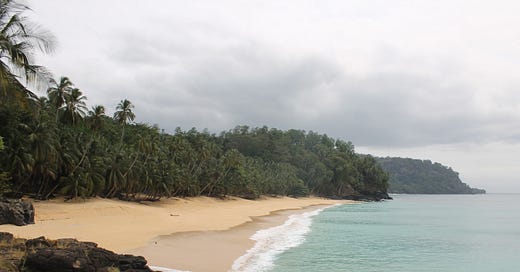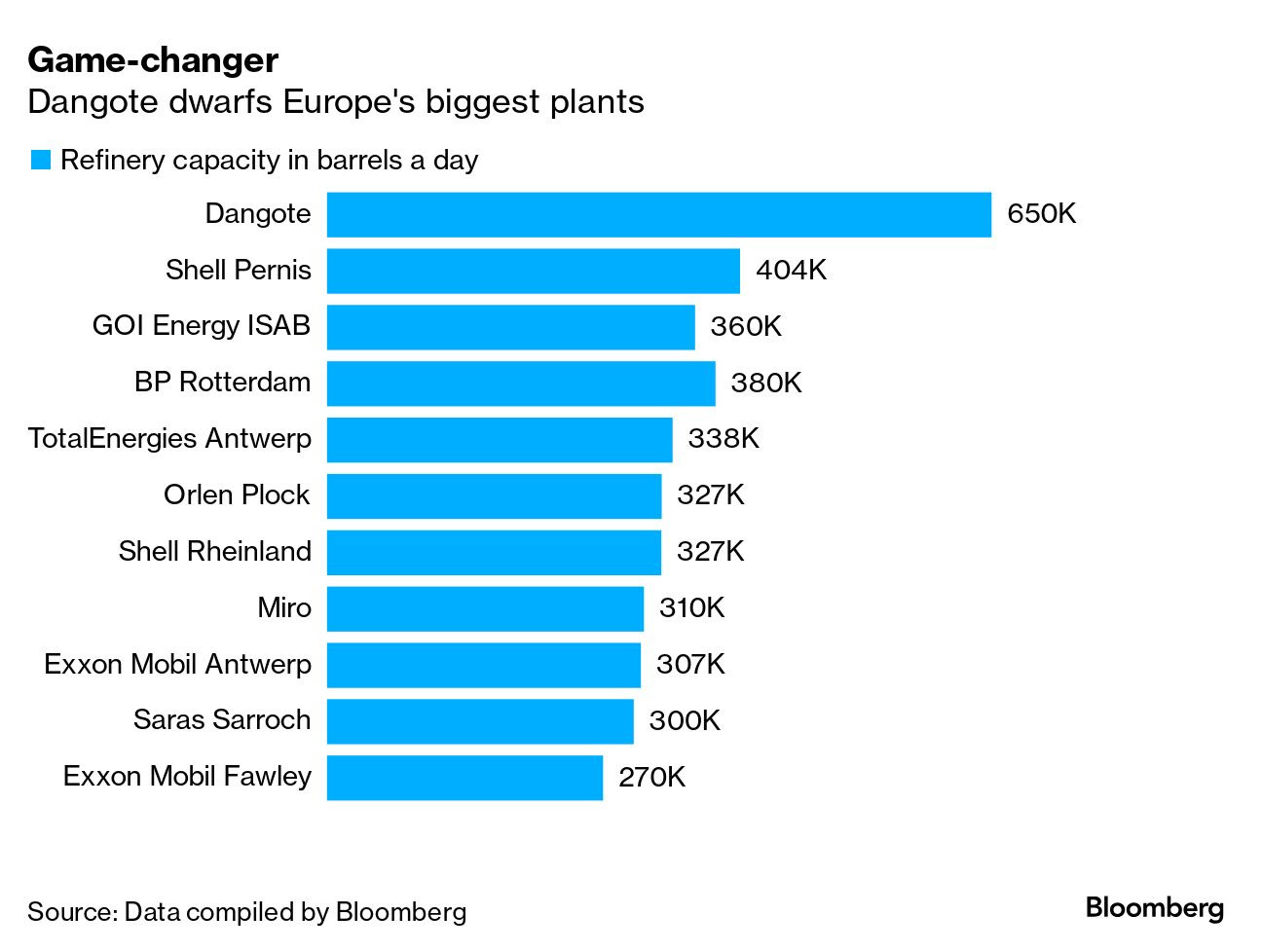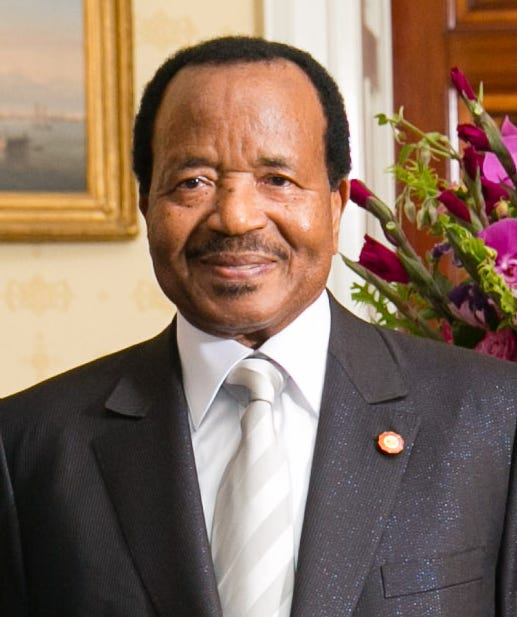🔅 Where Whales Breach and Billionaires Build
Cameroon Bans Media from Discussing President's Health & Sahara Floods
Image of the Day
Good Morning from Eswatini

Market Mondays
Year-to-Date Performance:
🟢 Johannesburg SE: 86,149.45 (+12.04%)
🟢 Nigerian SE: 97,606.63 (+30.54%)
🟢 Nairobi SE: 110.13 (+19.56%)
🟢 Ghana SE: 4,346.70 (+38.66%)
🟢 US S&P 500: 5,815.03 (+22.61%)
🟢 Shanghai Composite: 3,217.74 (+8.62%)
🇨🇩 A U.S. congressional watchdog has found no evidence that a Securities and Exchange Commission conflict minerals disclosure rule has reduced violence in Democratic Republic of Congo. It also said the rule - which requires some companies to report on their use of tantalum, tin, tungsten and gold - has likely had no effect in neighbouring countries.
🇺🇬 Uganda's central bank trimmed its key lending rate on Monday by 25 basis points for the second time in a row, lowering it to 9.75%, saying that inflation was expected to remain below its target in the near term. Meanwhile, the country’s anti-LGBTQ laws that include the death sentence in some cases have cost the nation as much as $1.6 billion since being introduced last year.
🇨🇮 Ivory Coast's coffee and cocoa regulator seized 33 trucks carrying around 1,100 tonnes of smuggled cocoa beans across the border with Guinea. Cocoa smuggling has increased in the region after poor harvests in Ghana and Ivory Coast, the world's second largest and largest producers.
🇿🇦 South African prosecutors say they will not pursue criminal charges against President Ramaphosa in relation to the controversial farm theft scandal that nearly brought down the president two years ago. A former spy chief laid a criminal complaint against Ramaphosa, accusing him of committing irregularities in trying to hide the theft of $4m (£3.25m) in cash at his home. The president denied any wrongdoing, saying that the money stolen from his sofa in 2020 came from the legitimate sale of his buffaloes.
🇬🇭 Global credit ratings agency Moody's on Friday upgraded Ghana's long-term local and foreign currency issuer ratings, citing extensive debt treatment that has significantly alleviated the government's financial burdens.
🇸🇳 Senegal said it will act swiftly to lower the budget deficit after an audit showed its fiscal position was weaker than the government had previously reported. The audit showed a fiscal gap of 10% of gross domestic product in 2023 — almost double that disclosed by the previous government.
🌍 Africa's natural gas production is expected to grow by 3% in 2025, after supply flattened in recent years. The International Energy Agency estimates that two projects in Congo and the long-awaited Tortue field in Senegal are among new and improved facilities that will boost Africa's contribution to gas supply next year.
🇪🇹 Ethio Telecom will become the first company to list on Ethiopia's new stock market this week when the government sells a 10% stake in the company. The establishment of a bourse as well as the privatisation of state-owned enterprises is part of Prime Minister Abiy Ahmed's push to open up the country to greater private investment.
🇰🇪 Kenya’s central bank surprised with its biggest interest-rate cut since the pandemic to help boost economic growth, after inflation eased to a 12-year low.
🇳🇬 Nigeria's local fuel traders can now buy petrol directly from the Dangote Oil Refinery, ending state-oil firm NNPC's exclusive buying rights as the country moves to fully deregulate its processing sector. The NNPC is now selling petrol at market prices for the first time in over three decades, marking the exit from a costly subsidy programme that has strained its finances. Meanwhile, take a look at this chart:
There you have it - a whirlwind tour of Africa's financial news.
*Data accurate as of the close of markets across the continent
Spotlight Stories
Spotlight on Príncipe: Where Whales Breach and Billionaires Build
Príncipe, along with its sibling island São Tomé, is a lush, green paradise where whales breach just offshore, monkeys chatter in the jungle, and coconuts fall from the sky like oversized hailstones. It's a place where nature reigns supreme, and the wildlife has been living its best life for millions of years, blissfully unaware of the trials and tribulations of the outside world.
The Financial Times recently wrote a piece on the island, and what lens did they choose to write it through? Well by highlighting a billionaire and foreigner’s love for the place, of course.
In 2009, South African software mogul Mark Shuttleworth, touched down on Príncipe and fell head over heels for its "primeval atmosphere."
A decade and $100 million later, Shuttleworth's company, HBD Príncipe (which stands for "Here Be Dragons," because why not?), has transformed the island with four luxury hotels that aim to boost the local economy.
The jewel in HBD's crown is Bom Bom, a collection of beachfront bungalows where you can lounge on pristine sands, explore the jungle with local guides, and maybe even spot some of those famous breaching whales.
But before you start packing your bags and practicing your Portuguese, it's worth noting that Príncipe has a complex and often dark history. The island was colonized by the Portuguese in 1470, who brought enslaved people from mainland Africa, along with convicts and even 2,000 Sephardic Jewish children, to work on brutal sugar, cocoa, and coffee plantations.
While slavery was officially abolished in 1875, forced labor continued until the country gained independence in 1975. This history is not fully acknowledged at one of HBD's hotels, Roça Sundy, which is a former plantation, raising questions about the ethics of plantation tourism.
There's no denying that HBD's presence has brought economic opportunities to the island, but it's important to consider the full picture. Príncipe's stunning natural beauty and unique wildlife make it a bucket-list destination for intrepid travelers, but its past and present are complex and deserve to be understood.
Cameroon Bans Media from Discussing President's Health (Really)
Cameroonians have been playing a nerve-wracking game of "Where's Paul Biya?" for the past few weeks, as the 91-year-old president hasn't been seen in public since attending a China-Africa forum in Beijing on September 8th.
While rumors of his demise have been circulating, officials insist that Biya is alive and well, enjoying a private stay in Geneva, Switzerland.
But now, the government has decided to take a page out of the "nothing to see here, move along" playbook by banning the media from discussing the president's health altogether.
Apparently, stories about Biya's condition "disturb the tranquillity of Cameroonians” and offenders will face the "rigour of the law."
Because nothing says "everything is fine" like threatening journalists with legal action for reporting on a matter of public interest.
Cameroonian journalists are understandably less than thrilled about this development, with many considering the ban a violation of press freedom.
The media restrictions have raised concerns about the safety of journalists in a country where media professionals are regularly targeted by officials and insurgent groups.
In the meantime, Cameroonians are eagerly awaiting the return of their president, as promised by the authorities.
Until then, it seems that Paul Biya will remain simultaneously alive and dead, depending on who you ask.
Sahara Floods: When the Desert Becomes an Oasis (Sort of)

Imagine this: you're trekking through the Sahara, the world's largest hot desert, expecting nothing but sand dunes and scorching heat. Suddenly, you stumble upon a lake. A real, honest-to-goodness lake, right in the middle of the desert.
No, you haven't stumbled into a mirage – you've just witnessed the first floods in the Sahara in half a century.
Two days of rainfall in September exceeded yearly averages in several areas of south-east Morocco, causing a deluge that filled up Lake Iriqui, a lake bed that had been dry for 50 years.
The rains that caused the flooding are what meteorologists call an extratropical storm.
As the world grapples with the effects of global heating, the Sahara floods serve as a stark reminder that no corner of the earth is immune to the consequences of a changing climate.
You can check out some of the unreal pictures from the floods here.
Food for Thought
“Many heads, much knowledge.”
— Ghanaian Proverb






